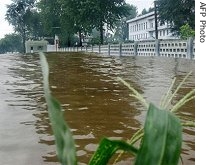-
(单词翻译:双击或拖选)
Geneva
17 August 2007
The United Nations reports massive flooding in North Korea has devastated1 the southern provinces, including the capital city and key agricultural regions. The U.N. reports that Pyongyang, in a departure from normal practice, has asked for international assistance to meet the emergency needs of the country's population. Lisa Schlein reports for VOA from Geneva.
 |
| A building flooded with water from the Taedong River in Pyongyang, 14 Aug 2007 |
Official reports say more than 220 people have died and the homes of over 350,000 people have been destroyed or damaged, and tens of thousands of hectares of farmland have been flooded. Officials say there has been huge damage to roads, bridges, public buildings and other structures.
A U.N. team that did an initial assessment2 earlier this week has confirmed the serious situation being reported by the government. The World Food Program says it sent a rapid assessment team on Friday, with the permission of the government, to survey sites in eight flood-stricken areas.
On the basis of what already is known, WFP spokesman Simon Pluess says it appears there has been widespread flooding of arable3 land in the southern half of the country.
"It is important to know that the southern half of the country is the main food producing area," said Pluess. "The area inundated4 is part of what is called the rice bowl. So, it is very fertile and important for the food security of North Korea. As you know, North Korea is a food deficit5 country and our fear is really that this year's floods will exacerbate6 the already food insecure situation in the country."
Pluess says the agency has 4,000 tons of food available in the country, which can be rapidly distributed to flood victims. He says this is enough to begin immediately feeding some 350,000 people.
The World Health Organization says it does not know whether there have been any outbreaks of disease in the flood areas. But WHO Spokeswoman, Fadela Chaib, says it is likely that outbreaks will occur and it is important to be prepared.
"When we are facing floods in any country … the main problem will be water and sanitation7 because these problems will, without doubt, mean that we will have water and food-borne diseases like diarrhea, cholera8 and dysentery, etc," said Chaib.
Chaib says WHO has set up temporary clinics to help the sick. The U.N. Children's Fund reports it has pre-positioned supplies in government warehouses9. Those supplies include kits10 of essential medicines and water.
 收听单词发音
收听单词发音
1
devastated

|
|
| v.彻底破坏( devastate的过去式和过去分词);摧毁;毁灭;在感情上(精神上、财务上等)压垮adj.毁坏的;极为震惊的 | |
参考例句: |
|
|
|
2
assessment

|
|
| n.评价;评估;对财产的估价,被估定的金额 | |
参考例句: |
|
|
|
3
arable

|
|
| adj.可耕的,适合种植的 | |
参考例句: |
|
|
|
4
inundated

|
|
| v.淹没( inundate的过去式和过去分词 );(洪水般地)涌来;充满;给予或交予(太多事物)使难以应付 | |
参考例句: |
|
|
|
5
deficit

|
|
| n.亏空,亏损;赤字,逆差 | |
参考例句: |
|
|
|
6
exacerbate

|
|
| v.恶化,增剧,激怒,使加剧 | |
参考例句: |
|
|
|
7
sanitation

|
|
| n.公共卫生,环境卫生,卫生设备 | |
参考例句: |
|
|
|
8
cholera

|
|
| n.霍乱 | |
参考例句: |
|
|
|
9
warehouses

|
|
| 仓库,货栈( warehouse的名词复数 ) | |
参考例句: |
|
|
|
10
kits

|
|
| 衣物和装备( kit的名词复数 ); 成套用品; 配套元件 | |
参考例句: |
|
|
|















